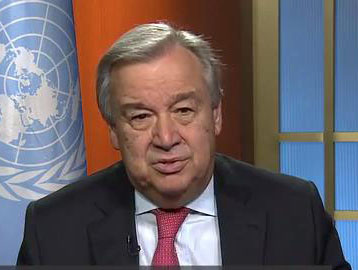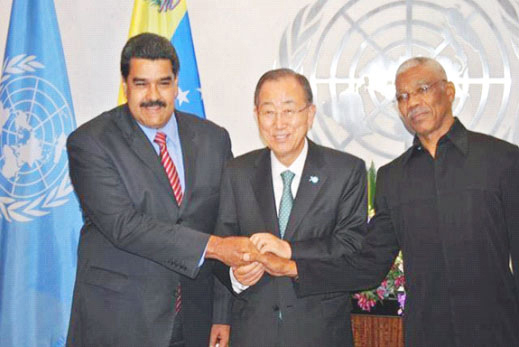By Cedric Joseph
On 30 January 2018, United Nations Secretary General, António Guterres, informed President David Granger that, having fulfilled the responsibility that had fallen to him within the framework set by his predecessor and since “significant progress” had not been made “toward arriving at a full agreement for the solution of the controversy”, he had “chosen the International Court of Justice (ICJ) as the means that is now to be used for its solution.”
In an address to the nation President David Granger welcomed the decision. A statement issued simultaneously by the Ministry of Foreign Affairs further observed that it had always held the view that the ICJ is the “appropriate forum for the peaceful and definitive settlement of the controversy”. Venezuela, on the other hand, criticized the decision stating that “maintaining political negotiation” under the Geneva Agreement is “the only path to reach a peaceful, practical and satisfactory solution” of the controversy. The statement ends with the warning that Venezuela will continue to defend “the sovereign rights on the Guayana Essequiba”, and held back from indicating whether it will participate in the proceedings at the ICJ.
The controversy is the Venezuelan contention that the Arbitral Award of 1899, which determined by a unanimous decision the frontier between British Guiana and Venezuela, is null and void. In February 1962, on the eve of the independence of British Guiana, Venezuela submitted its first formal claim against the long settled and internationally recognized frontier to the territory west of the Essequibo which was awarded to the former colony of British Guiana. That issue opened three options: resort to military means; a peaceful and definitive settlement; or protracted negotiations at a bilateral or other level.

The decision of UN Secretary General was reached after almost fifty-two years after the Geneva Agreement of 17 February 1966 had sought to outline a framework for the peaceful settlement of the Venezuelan claim to the Essequibo and to offer the new state some modicum of security. Notwithstanding, the succeeding generation has been exposed to an unrelenting period of violations of sovereignty and territorial integrity pursued through, interventions, occupation and other acts of economic aggression calculated to undermine the esprit de corps of the young nation. Yet it was a notable triumph for diplomacy, resolutely and confidently conducted by a small state pitted against the military prowess that recalls the age of the conquistadors. The decision was, as privately observed, “of transcendental importance”.
It was Secretary General Ban Ki-moon who had determined on 15 December 2016 that the Good Offices Process, which had been conducted since 1990, would continue for one final year, until the end of 2017, with a strengthened mandate of mediation and if, by the end of 2017, significant progress had not been made toward arriving at a full solution of the controversy, he will choose the Inter-national Court of Justice as the next means of settlement, unless Guyana and Venezuela jointly request that he refrained from doing so. That was the responsibility which was passed to, and accepted by, his successor Guterres.
The Secretary General’s authority lay in Article IV(2) of the Geneva Agreement that vested him with the power to choose the means of peaceful settlement of the controversy from those outlined in Article 33 of the Charter of the United Nations. The signatories to the Geneva Agreement were the United Kingdom, Venezuela and, upon attaining independence, Guyana. The Agreement came into force upon the date of its signature, 17 February 1966; the parties accepting the Secretary General’s right to choose the means of peaceful settlement which included judicial settlement. (It seems ironical, today, that it was Venezuela who proposed the UN Secretary General for this task). To implement the peaceful settlement by the judicial process, the International Court of Justice was established by the Charter of the United Nations as the principal judicial organ of the United Nations to function under an independent Statute.
In his decision of 15 December 2016, Ban Ki-moon had observed that a mutually agreed solution was in the best interests of both Guyana and Venezuela since it facilitated implementation.
The years following the Geneva Agreement were anything but rewarding. There was never any attempt by Venezuela to defend its contention that the arbitral award is null and void. The Mixed Commission, which met during 1966-1970, failed at a resolution. Its sessions were marked by hostilities: the occupation of the Guyana part of the island of Ankoko; advertisements in The Times of London warning off investors from the Essequibo; purported annexation of the territorial waters off the Essequibo; and instigating and conspiring with ranchers in the ‘uprising’ in Rupununi.
The expiry of the 1970-1981 moratorium, provided for under the Protocol of Port of Spain with the option of renewal, was rushed to facilitate President Herrara Campins’ announcement on 4 April 1981, immediately following an official visit by President LFS Burnham, that he would not renew the Protocol, had reasserted the claim to the Essequibo and rejected the Hydro-electric project of the Upper Mazaruni. This project, then deemed vital to development, which was being considered by the World Bank who, among others, had already assessed it as being technically and economically feasible, was abandoned following Venezuela’s official rejection. Other projects and investors would be similarly threatened and later abandoned in the coming years as further extraordinary maritime presumptions intensified the blockade to economic development.
The most threatening is the recent Maritime Decree issued by President Nicolás Maduro on 26 May 2015, reformed by Decree of 6 July 2015, purporting Venezue-lan sovereignty over the entire coast off the Essequibo and claiming exclusive jurisdiction over the waters adjacent to this coast to the distance beyond 200 nautical miles. This presumption was advanced on the eve of the inauguration of President Granger. Even more recent and ominous, in the Communiqué issued on 31 January 2018 in response to the Secretary General’s decision to choose the ICJ, is the further threat to “continue defending the sovereign rights over the Guayana Essequiba” and the closing statement that: “Venezuela’s sun rises in the Essequiba”.
Surely, the framers of the Geneva Agreement did not anticipate that with such an array of means for a peaceful settlement half a century would elapse and that no progress at all would be made in the resolution of the controversy. In truth, Venezuela was able to shape the half century into an era that was incapable of producing any definitive result while it cultivated, both at home and abroad, the culture of permanence of its claim promoting “Essequiba reclamacion”.
Venezuela must have been persuaded of the frailty of its claim premised upon a so-called memorandum, posthumously published by its junior counsel before the Arbitral tribunal, Severo Mallet-Prevost, alleging that the arbitral award is the result of a “deal” between Great Britain and Russia. It never really sought to defend the contention but, in place, designed to retrieve all of its losses, or what it had failed to gain, at the Arbitral tribunal, the Geneva Agreement and the Mixed Commission. Both administrations in Guyana had long recognised this protraction and exhaustion of this peaceful means of settlement, the futility of continuance and the imperatives for a definitive resolution through the judicial process.
It would take a herculean effort by any Personal Representative to make a positive impact and obtain significant progress in one final year. Thus, when on 23 February 2017, Guterres named Dag Nylander of Norway as his Personal Representative, an affable, energetic and accomplished diplomat, fresh from his success in securing the peace agreement in Colombia, for the final year of the Good Offices process, he virtually handed him an unenviable assignment.
Nylander approached his task earnestly, vigorously and assuredly. He made five visits to Guyana, commencing 12-13, April 2017, to meet a delegation, which included the Opposition, led by Hon. Carl Greenidge, Vice President and Minister of Foreign Affairs. He also made similar visits to Venezuela in the execution of his mandate. Then, during October and November, there were eventually three bilateral meetings with Venezuela in the lush environment of the Greentree Estate in New York.
On his last visit on 19 December 2017, he should have recognized that the enhanced mediation had collapsed and that the entire process was expiring. He must have known then that he should report that significant progress had not been made and, in the circumstance, Guterres was required to choose the ICJ.
Guyana’s fundamental position, publicly stated, represented a base beyond which diplomacy could not explore for any concession, symbolic or otherwise. One hundred and eighteen years after an arbitral award had unanimously defined a boundary-line that had been internationally recognized and after Guyana, as the predecessor colony of British Guiana, had enjoyed full sovereignty, effective and uninterrupted control over the Essequibo cannot be upset by an allegation emerging from the defective circumstances that shrouded the so-called Mallet-Prevost memorandum. No state in peacetime, not immobilized by war, negotiates its sovereignty and integrity. It is not a matter of the absence of good faith: it is simply real politik.
Moreover, if the process were inattentive to the past, Guyana was always mindful of the unbroken series of volte-face by Venezuela, who had rejected over the years all the legal instruments and processes that were jointly agreed. These included the Treaty of Arbitration of 1897 which established the Arbitral Tribunal; the arbitral award of 1899 and the Judges who framed that award; the demarcation of the boundary-line by the joint Anglo-Venezuelan Commission during 1900— 1905; and misrepresenting the intent of the Geneva Agreement as recognizing its claim to the Essequibo. Yet Venezuela would essay at this very late stage that the controversy be pursued “through diplomatic channels”. How in the context of the experience of the last fifty-two years can bilateral negotiations be continued when Venezuela has crippled every legal and diplomatic undertaking? Or, to what purpose can resort to other means of peaceful settlement, or an extension of the enhanced mediation process as proposed, have except to foster more prevarications and stimulate further efforts to undermine the general security of Guyana?
Guyana is pleased with the referral of the controversy to the Court, is confident of its strong case and will represent it vigorously in the years ahead. This, however, is not a time for vainglory. In this era of transformation there is the coincidence of anxieties and threats about procedural disruptions, some unsound theory about the Court’s jurisdiction—a seminal matter—and particularly the growing impact of the discoveries of oil within Guyana’s maritime zone. It is thus a time to be watchful and measured, and to proceed diligently and confidently with the preparatory work for the Court.
In this, the appropriateness of this referral to the Court is well endorsed in the Manila Declaration on the Peaceful Settlement of International Disputes in its remark: “Recourse to judicial settlement of legal disputes, particularly referral to the International Court of Justice, should not be considered an unfriendly act between States.” That declaration was approved by the UN General Assembly Resolution No: 37/10 of 15 November 1982.
A peaceful and definitive resolution will greatly relieve our Caribbean Community of a troublesome legacy of Empire. It will avail the leadership of another opportunity to develop the grand and practical integrative visions of Simón Bolívar, Forbes Burnham, Errol Barrow and Eric Williams for the advancement of the peoples in this zone of the continent. Only then may the people wish to celebrate.
Cedric L Joseph is a retired senior diplomat. He served as Guyana’s High Commissioner to the United Kingdom and subsequently as Head of the Presidential Secretariat






